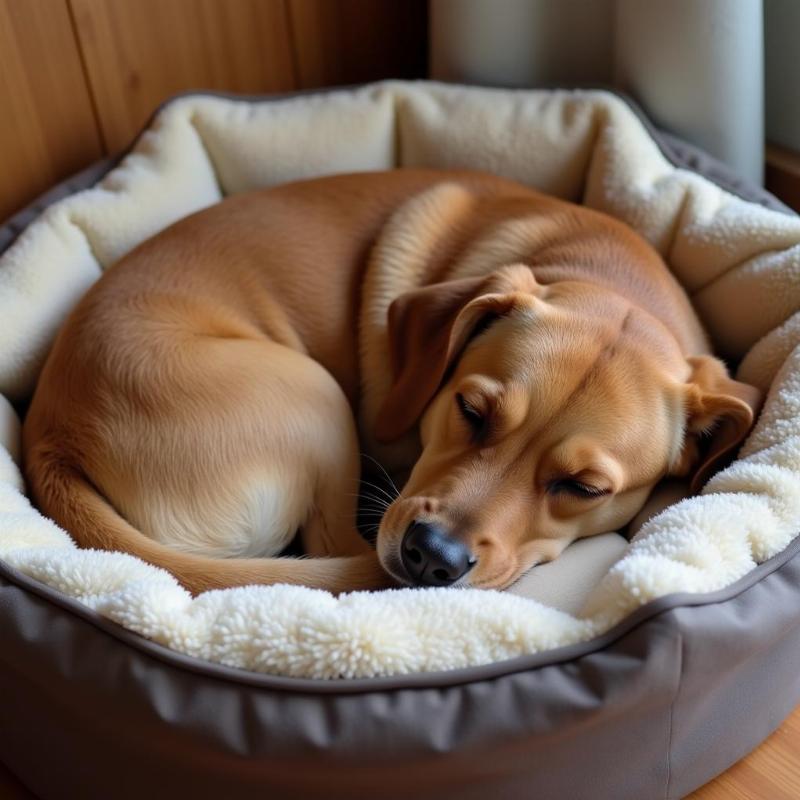Is your furry friend keeping you up at night with their tossing, turning, and pacing? Many dog owners wonder, “Why is my dog restless at night?” A restless dog can be frustrating for both you and your pet. Let’s explore the common causes of nighttime restlessness in dogs and discuss some solutions to help everyone get a good night’s sleep.
Common Reasons for Nighttime Restlessness in Dogs
Several factors can contribute to a dog’s restlessness at night. Identifying the root cause is crucial for finding an effective solution.
Discomfort
Just like humans, dogs can experience physical discomfort that disrupts their sleep. Arthritis, hip dysplasia, and other age-related conditions can make it difficult for older dogs to find a comfortable sleeping position. Allergies, skin irritations, and even a full bladder can also keep your dog awake. If you suspect your dog is in pain, consult with your veterinarian for a proper diagnosis and treatment plan.
Anxiety
Anxiety is a common culprit behind nighttime restlessness in dogs. Separation anxiety, noise phobias, and even changes in routine can trigger anxious behaviors like pacing, whining, and excessive panting. Creating a safe and calming bedtime routine can help ease your dog’s anxiety.
Boredom and Lack of Exercise
A bored dog is a restless dog. If your dog doesn’t get enough physical and mental stimulation during the day, they may have excess energy to burn at night. Ensure your dog gets adequate exercise with walks, playtime, and interactive toys. Mental enrichment through training and puzzle toys can also tire them out.
Medical Conditions
Certain medical conditions can also cause nighttime restlessness. Cognitive dysfunction syndrome, similar to dementia in humans, can affect older dogs and disrupt their sleep-wake cycle. Hyperthyroidism, Cushing’s disease, and other hormonal imbalances can also contribute to restlessness. If your dog’s restlessness is accompanied by other symptoms like increased thirst, appetite changes, or weight loss, consult your veterinarian.
Environmental Factors
The sleeping environment itself can also play a role. An uncomfortable bed, extreme temperatures, or loud noises can make it difficult for your dog to relax and sleep soundly. Ensure your dog has a comfortable, quiet, and temperature-controlled sleeping area.
How to Help a Restless Dog Sleep Through the Night
Once you’ve identified the potential cause of your dog’s restlessness, you can take steps to address it.
Establish a Bedtime Routine
A consistent bedtime routine can help signal to your dog that it’s time to relax and sleep. This routine could include a short walk, a quiet playtime session, and a final potty break before bed.
 Dog sleeping peacefully
Dog sleeping peacefully
Create a Comfortable Sleeping Environment
Make sure your dog has a cozy and comfortable bed in a quiet and dark area of the house. Consider using a white noise machine or playing calming music to help drown out any distracting noises.
Provide Enough Exercise and Mental Stimulation
Ensure your dog gets enough physical activity and mental stimulation during the day. Regular walks, playtime with interactive toys, and training sessions can help tire your dog out and reduce restlessness at night.
Consult Your Veterinarian
If you’ve tried these strategies and your dog is still restless at night, it’s essential to consult your veterinarian. They can rule out any underlying medical conditions and recommend specific treatments or medications if necessary.
Conclusion
Nighttime restlessness in dogs can be caused by a variety of factors, from discomfort and anxiety to boredom and medical conditions. By addressing the underlying cause and creating a supportive and comfortable environment, you can help your dog – and yourself – enjoy a good night’s sleep. If your dog’s restlessness persists, don’t hesitate to seek professional advice from your veterinarian. Remember, a well-rested dog is a happy dog!
FAQ
-
Why does my senior dog pace at night? Senior dogs can pace at night due to discomfort from arthritis, cognitive decline, or anxiety.
-
How can I calm my dog down at night? A calming bedtime routine, a comfortable bed, and sufficient exercise can help calm a restless dog.
-
Could my dog’s restlessness be a sign of a medical problem? Yes, restlessness can be a symptom of various medical conditions. Consult your veterinarian if the restlessness persists or is accompanied by other symptoms.
-
Is it normal for puppies to be restless at night? Puppies can be restless at night as they adjust to a new environment and learn to sleep through the night.
-
What are some natural remedies for dog anxiety? Calming supplements, pheromone diffusers, and gentle massage can help ease anxiety in some dogs.
-
How much exercise does my dog need to prevent nighttime restlessness? The amount of exercise varies depending on breed, age, and health, but most dogs benefit from at least 30-60 minutes of daily exercise.
-
When should I be concerned about my dog’s restlessness? If your dog’s restlessness is sudden, severe, or accompanied by other symptoms, consult your veterinarian immediately.
Related Articles on Beautdogs.us
- why is my dog wagging her tail in her sleep
- why won't my dog sleep at night
- dog breathing fast at night
- how to give your dog the best day ever
Beautdogs.us is your premier online resource for comprehensive dog care, breed information, and top-quality products for your canine companion. We offer expert advice and guidance to both novice and experienced dog owners alike. From understanding your dog’s unique needs to finding the perfect products, Beautdogs.us is here to help you navigate every aspect of dog ownership. Contact us for personalized support: Email: [email protected], Phone: +1 501-555-7529.